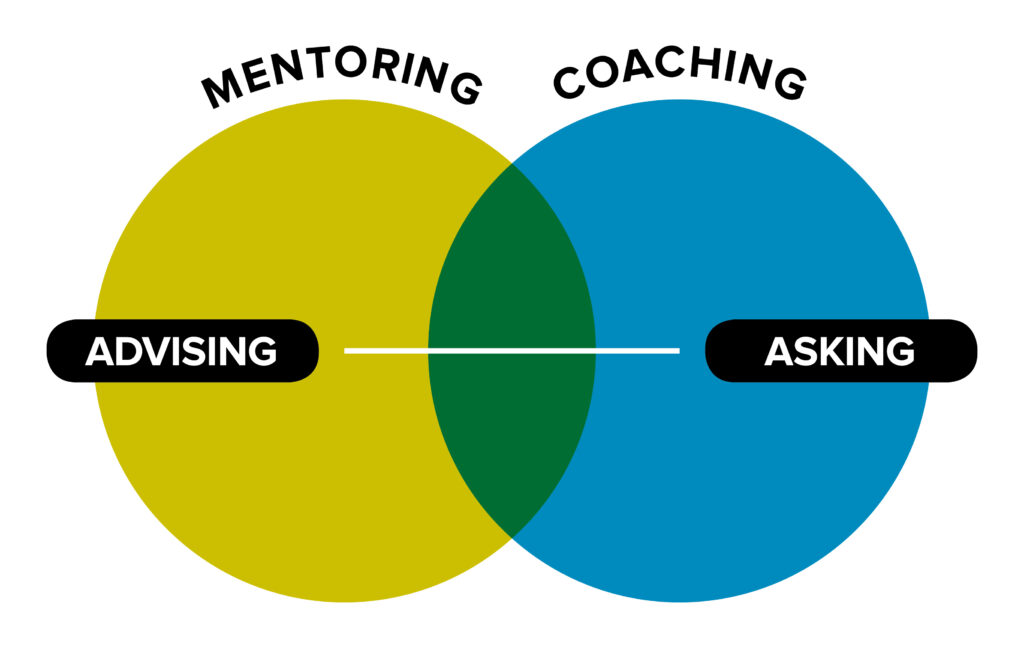Many people mix the phrases mentor and coach, although they are really two distinct notions. Although they share certain notions, they also have numerous characteristics that set them apart from one another.
There are distinctions between a mentor and a coach, as well as between mentoring and coaching programmes. In this post, we will define coaching and mentoring and how to choose which is best for you. First, let us define mentors and coaches.
Visit our coaching and mentoring training course.
What is a Coach?
Coaches are concerned with an athlete’s performance in certain activities. Coaches see you practising certain skills and highlight areas for improvement. You’ll take their suggestions into account, practise again, and continue the procedure.
Coach Carter and how he identified potential in his players may come to mind when you think about coaches. He’d see the actions and thought patterns that were holding them back. Coach Carter would assist them in breaking bad habits and becoming champions.
Sports were formerly solely practised by coaches. Yet, coaching started to infiltrate the corporate sphere in the 1980s. Financial advisor Thomas Leonard saw that his customers were following his financial and life advice. He’d give them frameworks for organising their lives, taking coaching off the court and into people’s lives. Thomas established life counselling as a renowned profession.
Coach Carter was more than just a basketball instructor. He was also a mentor since he helped them grow as people and sportsmen.
How do mentors work?
A mentor assists their mentees’ personal and professional growth. They are more concerned with the overall development of their mentee than with particular talents that may be gained via practice.
Coach Carter, for example, cared about his players and wanted to help them grow into mature, confident individuals in addition to terrific athletes. As a mentor should be, he was a role model for them.
As a result, a mentor is generally in a more senior position than the mentee aspires to. As a result, the mentor’s experience is priceless to the mentee. Their partnership is more than just a training relationship; it is a mutually beneficial relationship in which they share their unique experiences for the sake of mutual learning and growth.
Mentors may teach their mentees, but they can provide them with counsel and direction based on their own experiences.
It is critical to remember that a mentor should not be their direct manager. If a manager is also a mentor, this might create a conflict of interest. They have a clear motive to improve the performance of their mentee. What if the mentee is attempting to leave their present position? Instead, regardless of how it impacts their present position, a mentor may assist their mentee in working towards their objectives.
A coaching connection is unidirectional. To develop a successful mentoring relationship, however, trust, recognition of each other’s objectives, and a commitment to helping one other improve are required. There is no reason why a mentor cannot gain from assisting their mentee.
Can a Coach Serve as a Mentor?
While the phrases mentoring and coach used interchangeably, there are significant differences between the two. A coach may convert into the position of a mentor, much as Coach Carter desired more for his team than a title.
Typically, this shift occurs after the effective coach has effectively increased their coachee’s performance. When the coach accomplishes their specified goal, they have accomplished their mission as a coach, and their connection may expand into mentoring.
The mentee will most likely be quite grateful to their coach for all of their assistance. Similarly, the coach may please with how far they have come together. Their connection is now more mutually beneficial and resembles a friendship.
Mentoring vs. Coaching
- Mentoring is long-term, while coaching is time-limited.
Mentoring partnerships are long-term because they concentrate on their job growth holistically (more on this below). Mentors and mentees will discuss various goals, problems, and difficulties that may arise as their relationship develops.
Coaching, on the other hand, is time-bound and expected to achieve specified objectives within a defined time range. Coaches will have scheduled sessions with exercises that will guide their coachee (or student) in a certain direction.
- Mentoring is non-evaluative, but coaching is.
The first distinction is that mentoring is not focused on evaluation, but coaching is based on assessing performance improvement, whether via business performance reports or coaching assessments. As a result, mentors should not be the mentee’s direct supervisor or manager, while coaches are often externally recruited experts or managers who concentrate on certain skill growth areas.
- Mentoring is motivated by the mentee, while coaching is the inverse.
When a mentee is a member of a mentoring relationship, they are in control. They define the relationship’s objectives and what they want to work on. They seek time with the mentor and provide them with the issues they want to resolve.
The agenda for the interaction set by the coach or supervisor in coaching. This is due to the fact that coaching is based on performance. There is a particular skill or aim in which the coach is an expert or may give suggestions to better the coachee’s performance. Their advice limited to assisting the worker in developing the skill.
- Mentoring very customized, whereas coaching may repeat.
A mentee has specialised requirements and wants to address issues that are not necessarily related to company-wide, top-down performance efforts. Mentoring also allows you to expand your network by meeting new mentors and developing new contacts. This kind of mentoring is very beneficial for onboarding new staff.
In coaching, a company identifies a particular skill deficit and selects one or more coaches to deliver a generalised programme to address it. The content rehashed and generalised, and a coachee would not normally a networking opportunity.
- Mentoring promotes overall growth, while coaching promotes quantitative skill progress.
Mentoring is an excellent way to get access to the information, experience, and skills of someone more senior than you. Inquiring about the lessons they’ve acquired over their careers gives strategy information that is difficult to get elsewhere. Using such knowledge to accelerate your progress is priceless.
Yet what you’ll discover wasn’t quite evident until you met with your mentor. You had to pay careful attention as they recounted problems or pivotal events in their careers. Throughout the process, you might get useful insights into your profession. Your growth will be more comprehensive and scattered in this manner. Coaching is unique.
There are certain gains you are attempting to achieve with coaching. You may wish to work on your presenting and bargaining abilities. Your coach may request that you describe your strategy for improving these abilities and identify places where you might try different approaches. You may also have limiting ideas that prevent you from growing your bargaining abilities, for example. A coach would be useful in assisting you to shift your perspective and get the confidence you need to ask for a raise or make a strong presentation.





More Stories
Top Tips for Cultivating Business Success in a Remote Organization
Demystifying Money Lending: What Are Your Options?
Why Hiring the Right Professional is Important